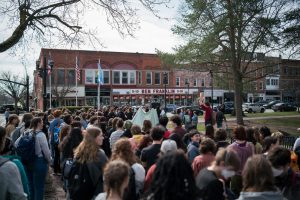Off the Cuff with Richard R. Love, Scientific Director of the International Breast Cancer Research Foundation
September 27, 2013
Richard R. Love, OC ’66, is the scientific director of the International Breast Cancer Research Foundation. For the past 20 years, Love has been conducting breast cancer clinical trials in Asia, and establishing new global standards for breast cancer care. He shared his thoughts with the Review on his Oberlin experience, his work in Bangladesh, and his plans for the future.
Tell me about your experience at Oberlin.
This woman I was talking to in this previous class [when I lectured this afternoon] is from Kenya and she was talking about the unusualness of the community [at Oberlin] and the degree of isolation from the real world. And she said that she thought there was still a sense of things being different, and when you go out into the world, there is still racism and I can very much remember that at the time. And I think that egalitarian kind of mindset, as I think about it, was set by my four years here at Oberlin. I have never gotten away from it.
Did you know you wanted to work in global healthcare when you went to Medical School from Oberlin?
No. When I went to medical school, I was thinking about global health issues. Then [later] at medical school, I knew I wanted to get into cancer research, and it took me fifteen years in academia to become secure enough academically and reach out to do cancer abroad.
How did you decide to go Bangladesh and develop your own treatment center?
I went there for my clinical trial. I went to Bangladesh because I was looking for women for my clinical treatment trial and I thought there would be women in Bangladesh who would be eligible for that trial. Indeed, there were. One of the things I’ve been involved in, in major ways, is to show that we can involve people who are poor or less educated in our clinical research and do it ethically while enriching our science. For the most part, clinical research is only done on wealthy people. And mostly, Caucasian, upper-middle class people. We lose a lot by not expanding the realm of people in our studies: ethnically, genetically, etc.
Why did you pursue oncology of all fields of medicine?
I trained in the Hopkins system and trained in the cancer ward. At that time, in 1972, there were systemic treatments for cancer and we were just beginning to make headway in leukemia. And this ward was predominately a leukemia ward, and it had adolescents and younger adults with leukemia. One day, I overheard a conversation between two young men from the ward. One patient had a history of rebelling against the treatment and leaving when he began to feel better and only returning when he felt sick, since he wasn’t fully treated. The second man was young [person] who had barely graduated from high school. His story was that he had developed leukemia and wanted to see the world. His doctor had promised him one year and on his way to California from Baltimore, he collapsed in Colorado because of anemia. He was shipped back to Baltimore and began to get treatment. This man was in trouble. The first man, Thurman, turned to the second man and said “What are you doing here?” and the second man replied, “Well a year ago, the doctor said I had another year left to live. My time’s up.” I kind of thought that if this is how people with life threatening disease who have had far fewer opportunities than I have had think about life and the big questions and face things head on, then I guess those are the kind of people that would be inspiring to work with.
What has it been like to see the evolution and advancements of oncology through your years of work?
I guess I would say I’m ambivalent. It’s true that there has been significant progress and it’s true that the morbidity due to these new treatments has decreased. I remember going on rounds and dealing with men with testicular cancer when we were just on the brink of a proper treatment for it. I remember seeing them as they were suffering horribly from the treatment and the head doctor continued to force more treatment on these people that could barely swallow. To move from that to circumstances where we can cure people with minimal symptoms is obviously nothing short of a miracle. Having said that, I find the disparities in treatments and outcomes among specific populations, very, very sad. And it’s very sad in this country, and it’s also sad to compare circumstances in this country with circumstances in countries like Bangladesh. My positive feelings on the progression of cancer treatment are tempered by this reality that we’re not making the population effects that I would like.
What are your plans for the future?
To keep doing what I’m doing. I don’t plan to go anywhere else; I’ve made connections, met amazing partners and people. I finally feel like I’m beginning to make sense of the problem that I’m trying to address. Like I said, we don’t need mammogram machines, we don’t need education. These women know that they have breast cancer, they’re smart people. 35% of adolescents under the age of five are malnourished. These women who are mothers are more worried about feeding their children and getting them to school and they just keep covering up their tumors as they get bigger and bigger. Feeding your children and getting them to go to school is what any good mother does. How do you expect them to seek treatment when they are having such a difficult time feeding their own children. My goal is making this care more accessible to women like these. I don’t need to go anywhere else.

























